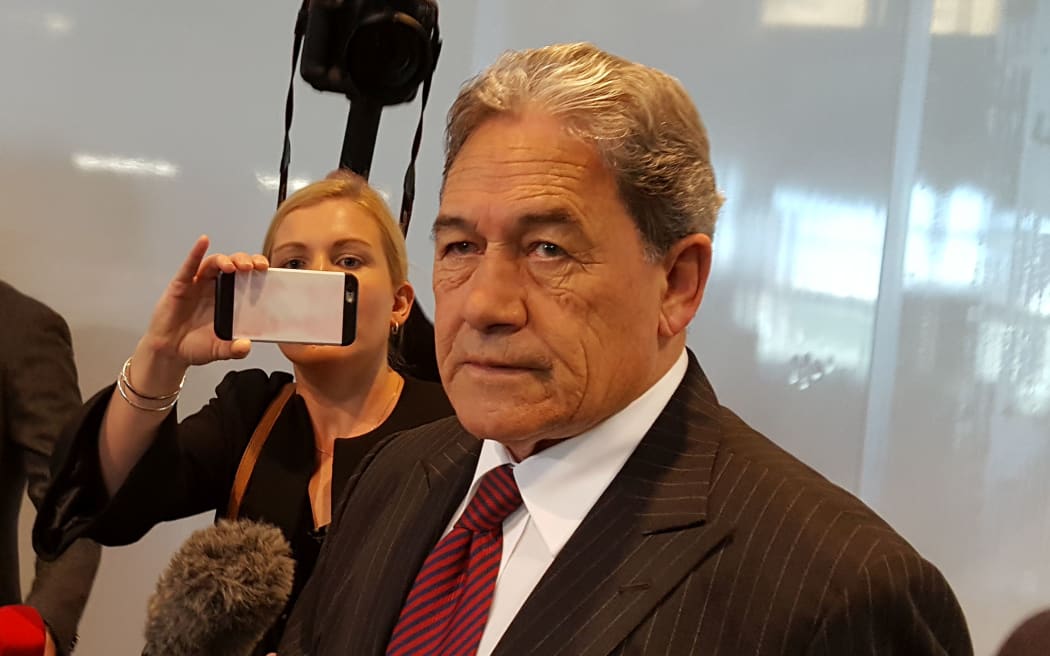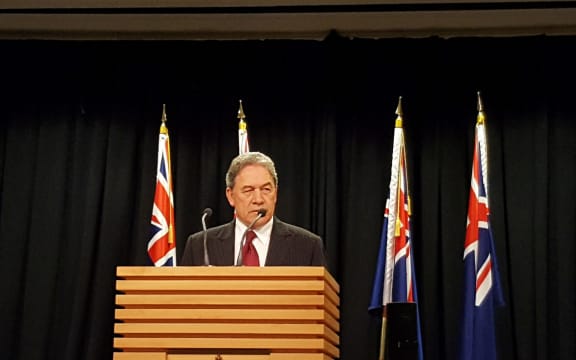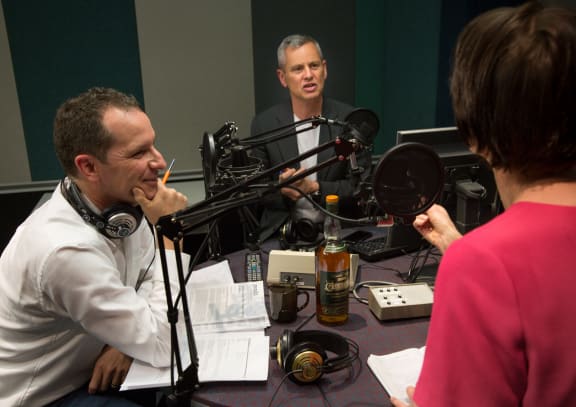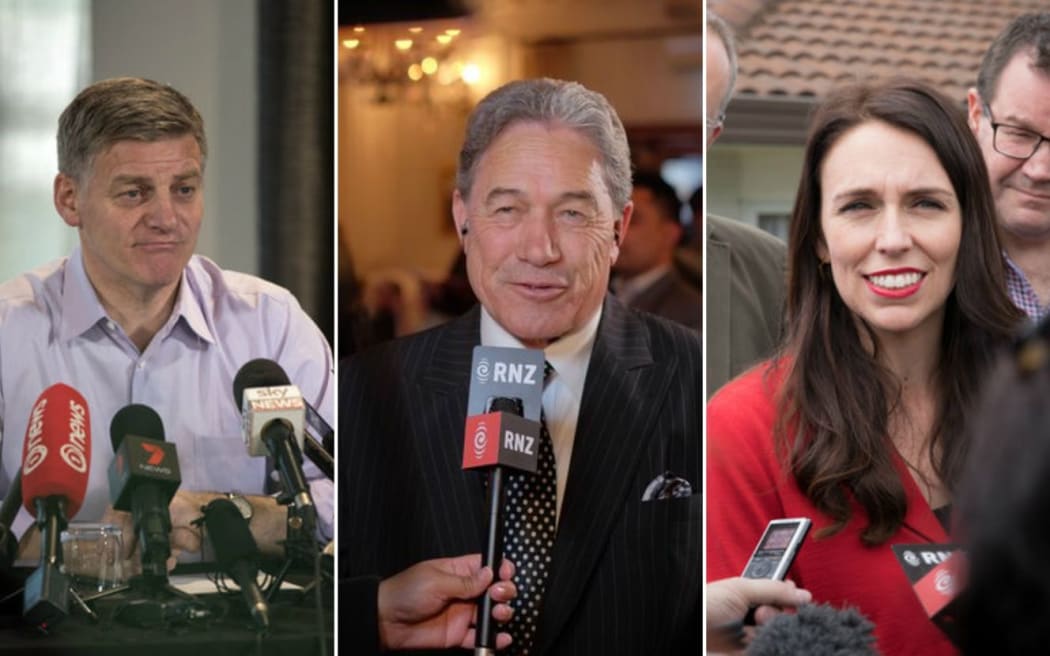In our 13th Caucus, it's negotiation time. So we look at Winston Peters' post-election posturing, 'constitutional conventions' and what New Zealand First needs from the next three years. Plus, we unpack the election results and what they mean for the parties.
Subscribe free to Caucus. On iPhones: iTunes, RadioPublic or Spotify. On Android phones: RadioPublic or Stitcher.

Photo: RNZ / Jane Patterson
That Winston, he's such an old curmudgeon. A funny old uncle. A bit cheeky, but good for a laugh. That's how most New Zealanders view the New Zealand First leader, who former Prime Minister Jenny Shipley has described as "an 85 percent outstanding leader".
In past episodes of Caucus we've argued that he can put the curmudgeonly personna aside when needed because he takes his constitutional role seriously. Cometh the hour, cometh the statesman. Yet yesterday has given us pause to doubt.
Now, with the serious responsibility of government in his hands, he is throwing his toys.
Caucus this week makes the case - not for the first time - for taking Winston Peters seriously and holding him to account as we would other party leaders. We've always taken him seriously, knowing that in all likelihood we would get to where we are now, with New Zealand First holding the balance of power. Which makes yesterday's petulant press conference all the more concerning.

Winston Peters Photo: RNZ / Chris Bramwell
New Zealanders have a habit of indulging Peters and enjoying the quick-witted, "maverick" pleasure he brings to the often dour business of government, yet just when we should be seeing him at his responsible best, he holds a press conference in which he spends half an hour not even trying to give a straight answer and simply lambasting journalists he has a beef with (and several he doesn't).
At a time when we are negotiating nothing less than the shape of our next government, Peters demands to be taken seriously, while at the same time delivering nothing more or less than farce and falsehoods. At yesterday's press conference he again insisted that he's never used the word bottom-line. That's simply untrue, as you can see here.
You could also note that in July this year, Peters said "My strategy is to tell everybody out there that you won't be talking to NZ First unless you want a referendum on both those issues [the Maori seats and a 99 seat parliament]". Yet yesterday he told an Australian news programme, "some of the things that, or elements to the environment on which a promise is made have since changed" and the Maori seats referendum could go by-the-by.
Or, you could wonder why Peters has said this week, both that "Negotiating is about getting all you possibly can for the people that voted for you" and that New Zealand First would act only in "the national interest". Which is it? The interests of his party or the nation? And how does that square with his position on negotiations going back to 2005, that "according to constitutional convention, the party which gains the most seats is the party which must first try and form a government".
Of course there is no such constitutional convention; whoever can convince the Governor-General they can command a majority in parliament can govern. The biggest party need not win. But is he bound by his word? Should he try to form a government with National, or can he play the two big parties off against each other and get "all you possibly can" for his 7.5 percent?
As Caucus discusses, it is right and proper for New Zealand First to wait until every vote has been counted and the party has no control over the speed at which that is done. Waiting another two weeks to form a government is not a problem.

Photo: RNZ / Cole Eastham-Farrelly
New Zealand First has earned the right in this election to negotiate to be part of that government. It has earned the right to negotiate hard for whatever gains it wants. As Lisa Owen reveals in the podcast, Peters has a strong track record of getting proportionately more out of his partners in government than his vote demands. But as Peters said to Guyon Espiner on September 14, "words matter" and it's hard to decide which words of his matter and which are bunkum. Because they can't all be true.
Imagine a press conference in which Peters stood up and soberly said that he would answer questions as clearly as he could, but that there would be many he could not. That he would responsibly wait until the special votes had been counted before commencing negotiations and that when it came to those negotiations he would do what he thought was best for New Zealand but be mindful of the proportionate power given him with 7.5 percent of the vote.
That would have been the stance of a statesman. Instead, in the face of largely procedural questions we got, "that’s a totally impertinent question. This is a party political matter", "You’re not getting a free-hit here mate. Get that through your head right now", and "you’re a News of the World person who doesn’t know anything about facts and honesty and integrity".

Photo: RNZ
So what will New Zealand First have to weigh up ahead of negotiations with both National and Labour? Alongside its view of what's best for New Zealand, much will likely involve the sustainability of the party and what it can take to the 2020 election. His supporters and foes alike will be fascinated to see if Peters and his negotiating team can keep their eyes on the prize... and to see exactly which prize they value most. The rest of that quote from Jenny Shipley comes from the RNZ podcast, The 9th Floor. She went on to say:
"...the 15 percent absolutely crippled him, because he would get so myopically preoccupied with a diversion that it took away his capability and intent on the main goal. Being the leader of the National Party, which he could have been. Being the Prime Minister, if he had navigated differently. Achieving things that he really wanted to do. Sometimes his temptation to be distracted, that literally absorbed him."
It's in the nation's interest now that his performance yesterday is shown to be an anomaly and the 85 percent great leader steps forward, not the 15 percent maverick.
If you enjoy Caucus, you might like to try Nine to Noon Politics

